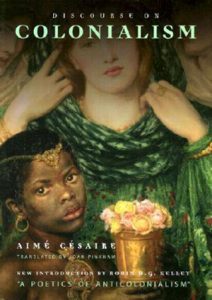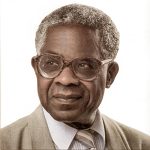Discourse on Colonialism

Author: Aimé Césaire
Translator: Joan Pinkham
Publisher: Monthly Review Press
Year of Publication: 2001
Print Length: 102 pages
Genre: Non-Fiction / Essay
Area: The Caribbean, Africa, South/Latin America
Topic: Black People, Afro-Caribbean, Colonialism & Post-Colonialism, Decolonization & Anti-Colonization, Slavery, Racism, Capitalism, Identity, Cultural Heritage / Legacy, Western Liberalism, Self-Determination
This classic work, first published in France in 1955, profoundly influenced the generation of scholars and activists at the forefront of liberation struggles in
Africa, Latin America, and the Caribbean. Nearly twenty years later,
when published for the first time in English, Discourse on Colonialism
inspired a new generation engaged in the Civil Rights, Black Power, and
anti-war movements and has sold more than 75,000 copies to date.
Aimé Césaire eloquently describes the brutal impact of capitalism and colonialism on both the colonizer and colonized, exposing the contradictions and hypocrisy implicit in western notions of “progress” and “civilization” upon encountering the “savage,” “uncultured,” or “primitive.” Here, Césaire reaffirms African values, identity, and culture, and their relevance, reminding us that “the relationship between consciousness and reality are extremely complex. . . . It is equally necessary to decolonize our minds, our inner life, at the same time that we decolonize society.”
An interview with Césaire by the poet René Depestre is also included.
Table of Contents
A Poetics of Anticolonialism — Robin D. G. Kelley
Discourse on Colonialism — Aimé Césaire
An Interview with Aimé Césaire – René Depestre
Notes

Aimé Césaire is Martinican poet, playwright, and politician, who was cofounder with Léopold Sédar Senghor of Negritude, an influential movement to restore the cultural identity of black Africans. Together with Senghor and others involved in the Negritude movement, Césaire was educated in Paris. In the early 1940s he returned to Martinique and engaged in political action supporting the decolonization of the French colonies of Africa. In 1945 he became mayor of Fort-de-France, the capital of Martinique, and he retained that position until 2001 (he was briefly out of office in 1983–84)
Source: https://www.britannica.com/biography/Aime-Cesaire
More from Aimé Césaire in this library, click here.
